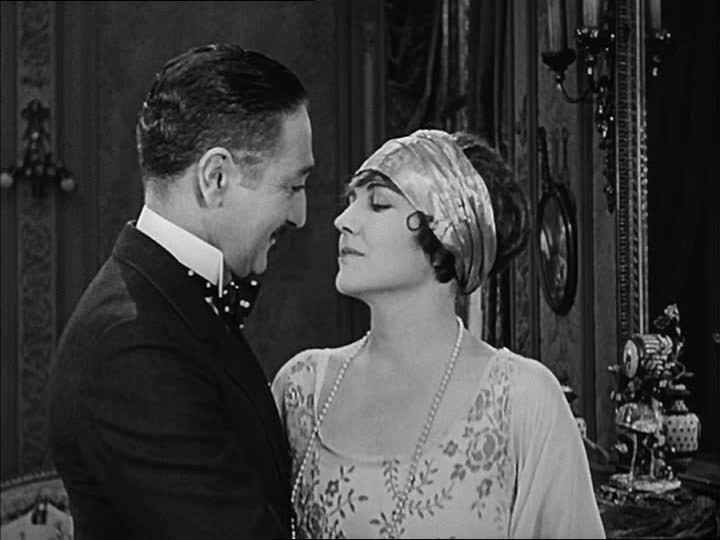
Charles Chaplin's A Woman of Paris was a very conscious departure for the writer/director/comic. Chaplin had just begun making features, and now he was ready to expand beyond comedy, for the first time making a film in which he did not star, and which was a serious drama with virtually no humor whatsoever. It was also an attempt to provide a showcase for Edna Purviance, who had been Chaplin's most prominent leading lady since his Essanay period; Chaplin wanted to make her a dramatic star rather than just his comic foil. Chaplin was very aware that this change might not be welcomed, and he defensively prefaced the film with a letter handed out to audience members, warning them not to expect a typical farce with the Little Tramp. It didn't help: the film was a flop, and Purviance never became the silent star that Chaplin had wanted to make of her.
It's not hard to see why the gambit failed: under the weight of expectations, A Woman of Paris couldn't help but be a disappointment, or at least a shock to the system. It's a straightforward, subtly acted romantic melodrama that veers into tragedy several times over, with little in common with the famous Tramp's other films to that point. Taken on its own merits, though, it's a fine example of this kind of 1920s moralist tragedy, simple and direct and boasting a number of especially nuanced portrayals. It's only by comparison with the rest of Chaplin's oeuvre that one feels something missing, the supple balance of comedy and sentiment that characterized his best works, here with the comedy removed to focus exclusively on darker emotions.
Purviance plays Marie St. Clair, a young woman preparing to run off to get married with her sweetheart Jean (Carl Miller), a young artist, even though their parents disapprove of the affair and try to keep them apart. Their hopeful young love is shattered, though, when a tragedy prevents their elopement, and they wind up going separately to Paris and living very different lives. While Jean lives with his mother as a starving artist, Marie becomes the mistress of the playboy Pierre (Adolphe Menjou), who keeps her in a luxurious apartment and gives her a life of leisure and pleasure, even though he's due to marry someone else. She's a fallen woman now, but interestingly, Chaplin makes this life look fun, and Menjou delivers a surprisingly sympathetic performance as the corrupt, decadent ladies' man. There's real affection between them, maybe even something like love, and the chemistry between them complicates the film tremendously, pushing it beyond its moralistic melodrama.

The performances in the film are naturalistic and subtle, creating real pathos for these characters. The film may not have made Purviance a star, but it probably should have. She has a warm, unstudied humanity to her that was always evident in her work with Chaplin but is especially apparent here, where she finally gets a spotlight all to herself. Her character reacts to the twists and turns of her life with a laugh and a shrug, trying to project an aura of carefree indifference, but Purviance always lets the woman underneath the flapper shell shine through, more upset and hurt by the men in her life and their cruelties than she ever lets on. And yet Marie tries to make the best of it all, even when she's reunited with Jean and is torn between her life of comfort and the possibility of rekindling what they once had, if it's even possible. Marie is an interesting character, and only at the end of the film is she finally confined to the conventions of the 1920s melodrama, forced to pay for the misunderstandings that had ruined her life, giving up her partying for an existence dedicated to service, caring for orphans to replace the family that she might've once had with Jean if things had gone differently.
Before this disappointingly pat ending, and despite the more melodramatic contrivances of the script, Chaplin does a fine job of exploring the subtle, contradictory emotions at the heart of the film's relationships. Aided by the exceptional performances of Purviance and Menjou in particular, the film is awash in sadness and loss. It's not surprising that Chaplin, chastised by audience disinterest, returned immediately to comedies, and Purviance's career unfortunately all but ended here. It's not quite a shame — there's no question that Chaplin's comedies would always be his most enduring works — but A Woman of Paris represents a different and rather interesting side of Chaplin's art, focusing on the emotional richness that also always made his comedies so distinctive.
One of Chaplin's greatest acivements A Woman of Paris is the film that invented Lubitsch.
ReplyDeleteNo, I am not kidding.
I also loved this film deeply, though I understand where Ed is coming from when he notes being underwhelmed only when one puts this film up against the great Chaplin masterpieces. But I have always felt that A WOMAN IN PARIS was exceedingly underrated, and it's every bit as emotionally resonant as THE KID. I like the use of the words "pathos" and "naturalistic" as these are compelling here and Edna Purviance gives a wholly extraordinary turn, the best of her career. As you note Menjou is every bit as impressive.
ReplyDeleteTerrific piece, Ed!
Instantly Watch Thousands of TV Episodes & online movies & Movies streaming online absolutely free !!Watch and download all your favorite movies online for free. All movies are streaming and free.
ReplyDelete